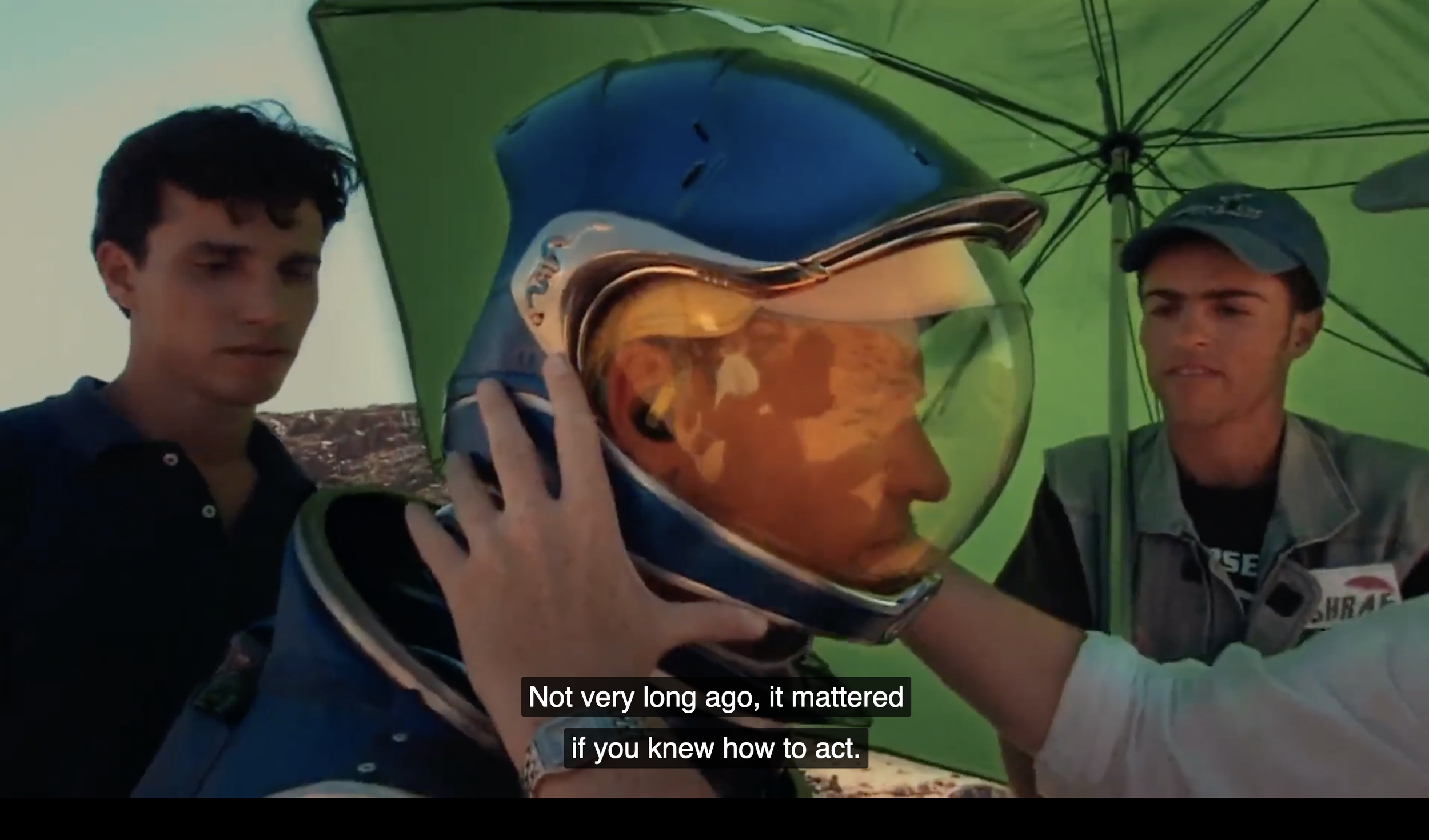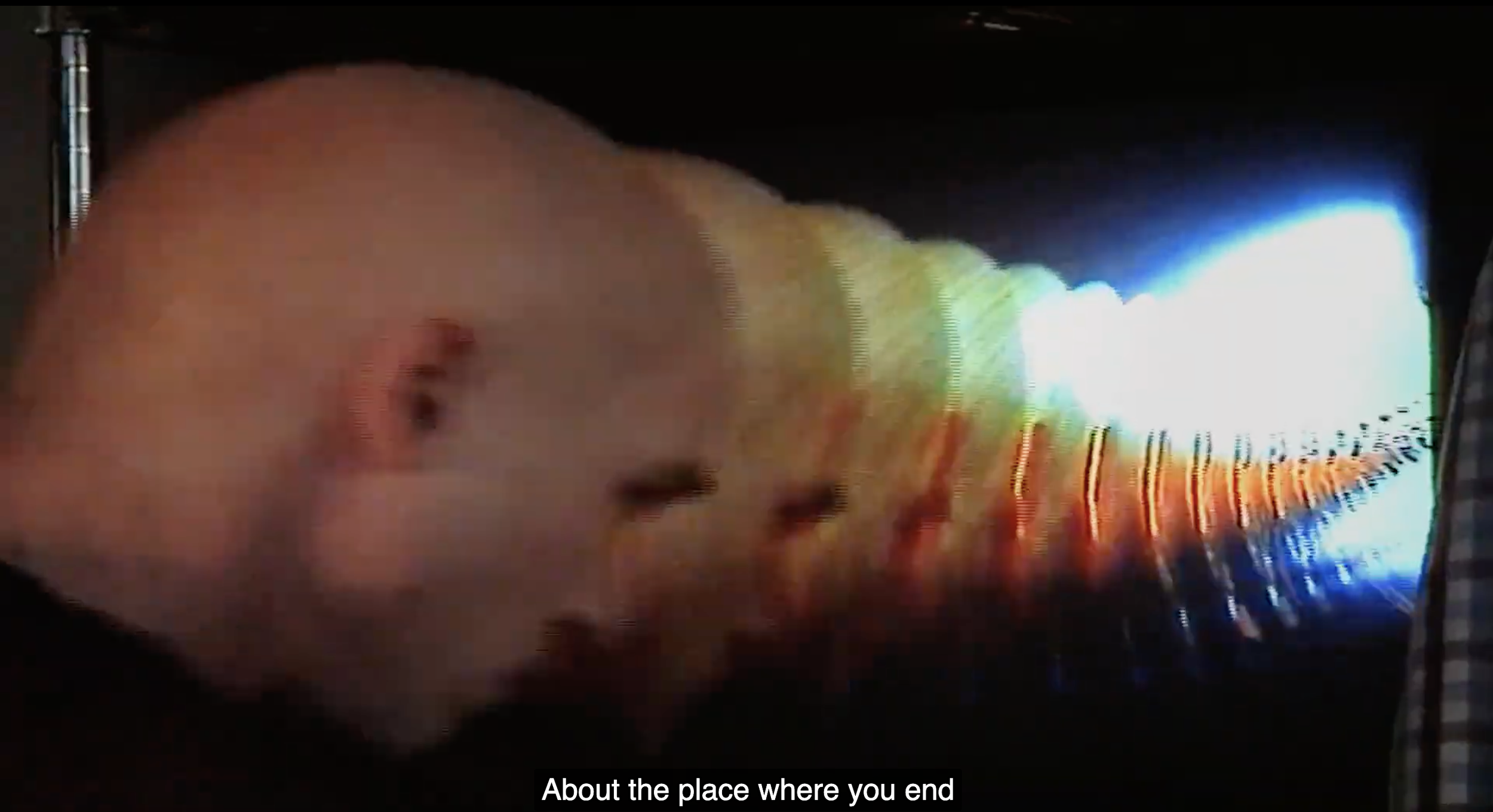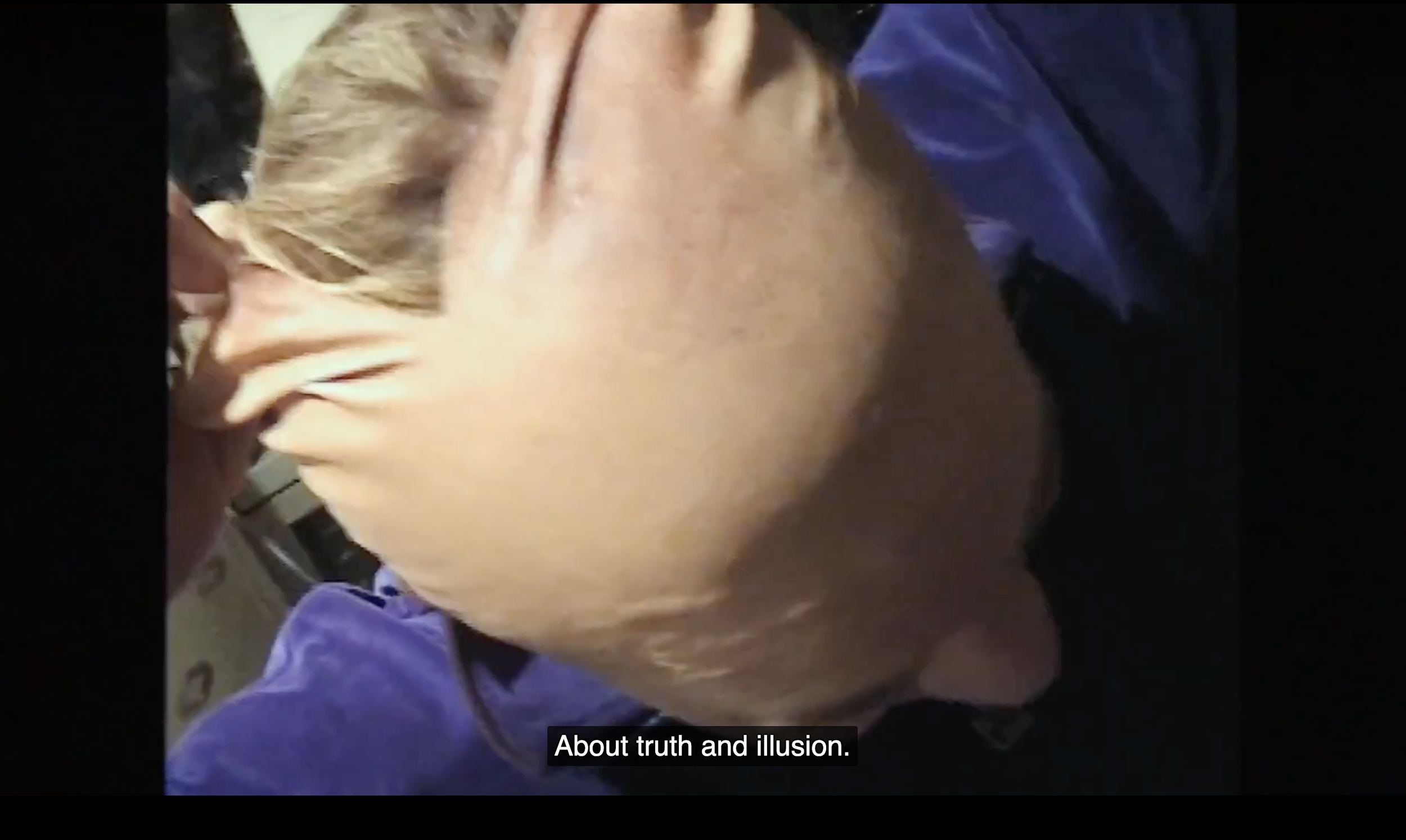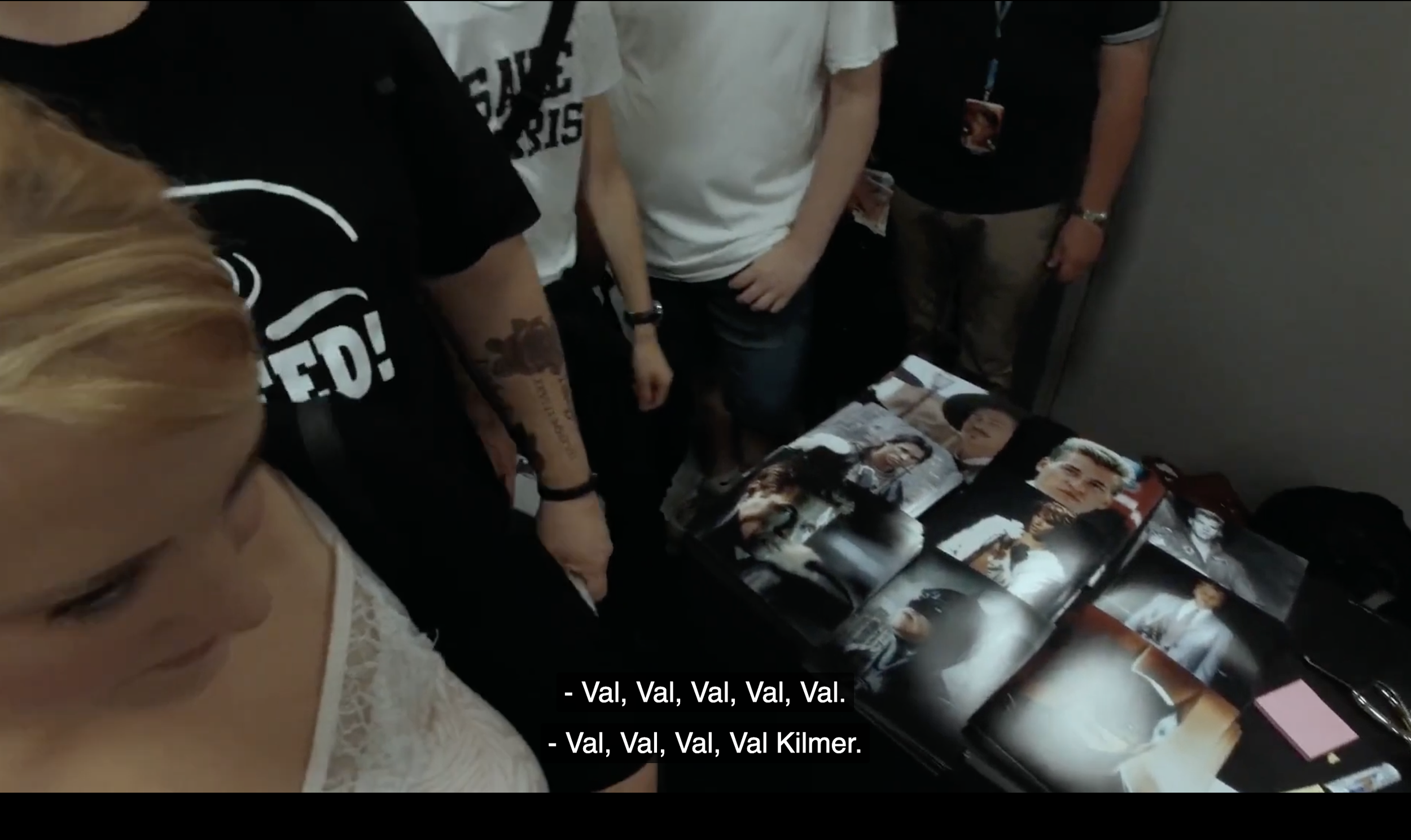4:2:25
*Note: I originally wrote this post about Val Kilmer, who just died at 65, in mid-November of 2024 (November 14, to be exact), during the Mars retrograde in my 12th house. I never posted it. I didn’t upload a lot of the long film essays I wrote during that very inward period where I would write constantly and then put what I wrote into the draft box. It seems fitting now to post it. I have since then thought about publishing this piece—waiting for the right time—and about Val Kilmer, who was strange, extremely eccentric (With age, he became very Aquarian. He abandoned his matinee idol looks because he’d lost them and then became extremely ill), suspect, and very interesting to me all at once, and whose memoir I read before I watched the documentary, Val (2021). I rewatched most of Kilmer’s movies in November 2024. Everything but Oliver Stone’s, The Doors, which I will watch this week. His performances in Tombstone and Heat still astound me. RIP.
"Acting Class," poem by Val Kilmer, 1987-1988
It’s hard to analyze people you don’t know. It’s hard to analyze people you do know. To analyze an actor you don’t know is almost impossible. Actors don’t even know themselves who they are because actors are not themselves. An actor is mask, lore. An actor is gossip. An actor is illusion. An actor is a program, a script. An actor is a liar (Mel Gibson 1998: “The lying thing is something you have to try and overcome.”). An actor is a slave and a prostitute. An actor is a mind controlled person who has learned to split himself. To analyze an actor rather than a role are two very different things. Decades of celebrity features and puff pieces about actors were just damage control and cover ups for the lie that is the actor in the acting industry. They revealed nothing. They hid and concealed. To think you know something when you don’t, when what you think you know is a lie, is the definition of betrayal. An actor betrays your trust.
In 1994, Gary Oldman said an actor does not know who he is.
He is everyone. He is no one. He is possessed. He possesses.
So I will proceed with this question:
What is the difference between acting and Mkultra? Between the previous generation (20th century) of actors and this current post-digital era of actors (21st century)? An complex, sensitive, still-human vessel—a vessel with an interesting and deeply flawed human soul—vs a cloned generic completely programmed slave vessel that has no original self left and grew up on camera.
What can someone like this, someone who has spent their lives looking at themselves on camera and living online, bring to the movie screen? How can someone like this move the world?
Director Sydney Pollack once told Charlie Rose that actors do “a very difficult thing because they are trying consciously to create something that doesn’t work consciously.” Which is to say, talent is a mystery you cannot control.
But also, there are certain things one cannot do or say off-camera?
Not so in an era of total contrivance and show.
This is one of the key differences in the two eras of acting. Actors of the 20th century were caught in this painful dance of conscious and unconscious, and it is in this liminal space of performance and performer, onscreen and offscreen (a distinction and demarcation that no longer exists) that the “magic” happens. That we begin to see something onscreen worth seeing. Worth paying a ticket for and sitting in a theater for. For this “magic” to happen, there has to be something unconscious that shows up on screen—something from inside, something from beneath, something beyond the script. We can call this interiority. To what degree and how much this inside reality is contrived, self-conscious, artificial, or manipulated, or can be manipulated by the actor is the always the great question none of us have the answer to, especially not the actor, who is not himself, who cannot by definition be himself, who original self has been destroyed and erased, but whose body and face are his alone. An actor is Legion.
What is intriguing and moving about an actor and what he does is this lost interplay between the conscious and unconscious. This is is also why an actor is always driven insane by fame, if he wasn’t insane and compromised to begin with. To do this, to live this way, to dissociate all your life, is not sustainable or bearable. Nor is it in any way normal. Fame was created to kill people, or at the very least, to kill true creativity.
Two quotes come to mind, both from Robert Bresson’s Notes on Cibematography:
“Montaigne: The movements of the soul were born with with the same progression as those of the body.*”
and
“Unusual approach to bodies.
On the watch for the imperceptible, the most inward movements.”
When an actor like Val Kilmer (whose films I have been revisiting the past few weeks) was given a script, something beautiful would happen, not every time but sometimes. Something that is like what we see in his performance in Michael Mann’s Heat, where Kilmer has to drive away from his wife and child, who he will never see again, into the long night, which is a place of total grief, for which there is no destination or return. That beautiful thing is the look on his devastated face in close-up: the happiness, the relief, the momentary hope, the split-second realization of loss that will last forever. Kilmer’s big goofy teeth smile artificially, like an alien, and remind you that he is a boy from the CA Valley. The string music washes over his face.
Also: his character has been badly shot, so he is in that kind of deep pain too. I feel certain the final seconds of Kilmer’s blue-lit face in the car is Mann’s homage to Julie in Krzysztof Kieślowski’s Blue, released just two years before Heat—so fresh on Mann’s mind—and one of the greatest films on mourning.
Val (2021), a documentary about Kilmer features 40 years of Kilmer’s home recordings, made me incredibly sad, for so many reasons. For all the reasons I used to write about when it came to actors. And for all the reasons I write about now. The screenshots below are from Kilmer’s narration/memoir (voiced by his son). The film, Kilmer states, is about an actor “who wants to tell a story about acting.” Kilmer was onto the obsession with self-documentation ahead of everyone else; he kept a video camera running at home, on movie sets, wherever he was, all the time. He filmed everything. He filmed himself constantly, on movie sets and at home.
After his throat cancer surgery, Kilmer spoke through a voice box and ate through a feeding tube. Where the movie star and the movie idol are concerned, there is always not just the question of what happened to the voice, as is the case with Kilmer, but what happened to the face? Before he lost his voice to cancer and radiation, Kilmer had spent years aging badly, his once chiseled features becoming bloated and puffy.
It is not easy to watch someone’s appearance change and deteriorate, especially a famous person’s. People can’t take it. I can’t either. We take the ruin personally. Maybe we are reminded of our own ruin, and actors are meant for escapism. If it happens to them, we think, it will happen to us.
Telegraph referred to Kilmer as “Hollywood's most notorious perfectionist,” making audition tapes no asked for. A harsh assessment given that our entire reality and existence now is a social media cesspool no one asked for.
What is a memoir or biography when you have always been other people? What is a person—identity—when you have always been an actor? I don’t know how much is true, or if truth has anything to do with acting anymore, which actors always claim it does, but Val is a beautiful film. It’s also a film about an archivist, an actor who was obsessed with recording everything with his video camera, and how that used to make people feel, before iPhones and social media. People didn’t really like it, or trust it. I still don’t like it or trust it.
Kilmer was a person who was behind his own camera as much as he was front of Hollywood’s. This is almost more interesting, as until now, actors in the 70s, 80s, and 90s, who may have recorded everything, did not have social media, so home movies were more private and intimate than performative and public. They were just that: home movies.
It’s also so so strange (and endearing) to see so many now-famous American actors, who have become deranged and wildly vain on Instagram, be what can only be described as shy when Kilmer films them with his video camera off stage, or backstage, something that is completely inconceivable today. Shyness on camera? Weariness of a camera? “Is that a video camera?” actors like a young Sean Penn and Kevin Beacon naively ask, like they’ve never had a camera pointed at them.
The year was 1983.
In general, people—even famous actors—were otherwise camera shy. That seems normal to me. The lore about the famously recalcitrant De Niro not being able to talk on camera or give a decent TV interview unless he was playing a character in a movie comes to mind. The idea of an actor being shy is somehow both touching (however put on this claim of shyness may have been. Actors can pretend to be anything) and disturbingly dissonant.
The look in people’s eyes, that’s how you know who is still sincere and uncorrupted. There is no other way to know. Don’t go by what people say. Go by how they move in the world. Do they live the way they talk? Do they keep their promises? Or is everything broken into pieces?
Was it Bresson who said that being on camera was a very serious thing, and not to be taken lightly. By any of us. 20 years of social media and we know it’s deadly and deranging and dumb as fuck. Has anyone who has grown to be addicted to living this way, which is to say the entire world, fared well? Are actors better in their movie roles because they know how to promote themselves and “talk directly to their fans”?
Kilmer’s now-famous audition tapes for various directors in the 1980s and 90s are fascinating—he made them without being asked to because he coveted certain parts, like Full Metal Jacket and Henry Hill in Goodfellas. He didn’t get the roles, and now that we know who did, of course it makes sense why. Roles are like destiny, you can’t imagine it being any other way. A part only belongs to the person who was meant to play it. It’s also interesting to see the way Kilmer failed at his marriage to the beautiful Joanne Whalley, his dream girl, he said, yet treated her like all dream girls are treated, like shit. The obsession of being in movies was more important than his marriage and children. Affairs ensued. You know the drill. During this time of personal dissolution, Kilmer became obsessed with playing Jim Morrison in Oliver Stone’s The Doors, which I saw on 8th Street in NYC when it came out, in a little theater by NYU I used always go to when I was a kid. I saw Some Kind of Wonderful and Ghostbusters there too.
Because of his throat cancer, Kilmer’s adult son narrates the film, which is in Val Kilmer’s words. His son’s voice is eerily similar to his father’s, when he was a young actor. Only it’s more meek, and softer, as all young men today sound.
I will now share an incredibly strange and very funny anecdote a male friend once told me about Val Kilmer, who was hitchhiking in Connecticut. Starstruck and huge Top Gun fans, my male friend and his buddy were driving and picked up Kilmer, who, it turned out, had no place in particular he needed to go. This is maybe 20 -25 years ago, well after Kilmer’s hey day as a onscreen leading man, and some years into his semi-cancellation/hermitage for being a “difficult actor.” Kilmer, a total eccentric, my friend told me, wouldn’t stop talking their ear off, and didn’t want to get out of the car—in a nice way. He was enjoying himself. Eventually, they found a way to get rid of him (they were going to a wedding), but not before Kilmer insisted they exchange telephone numbers! For weeks and months afterwards, Kilmer would call my friend, wanting to talk on the phone for hours, until my friend, in his early 20s at the time, stopped answering the phone, and Kilmer resigned to leaving long messages on his answering machine, some of which I had the pleasure of listening to. You can’t make this up. It’s one of the greatest stories I’ve ever heard. I often think of this tale whenever I watch a film that Kilmer is in. We used to howl with laughter when we talked about it. It’s charming, weird, and sad all at once. And now, after seeing the Val documentry, I can easily imagine it being true.
Kilmer was never my thing growing up—he was too much older. And he wasn’t my physical type as a kid either. But can you even compare his talent, or face, or screen presence to any American actor working today, at that level? Think Tombstone, think Heat, think Doors. Glen Powell? No way, no comparison. He’s a boring generic gym doll. If Glen Powell is the best we can do as a red blooded actor after decades of interesting American screen men like Jeff Bridges, Gene Hackman, Harrison Ford, young Al Pacino, William Hurt, Richrd Dreyfuss (my favorite), Mel Gibson, Val Kilmer, well then, we’re done. And we are done.
Powell is dumb and it shows. Kilmer was regal on screen and introspective and weird. The intensity from his Scorpio Midheaven/Venus in Scorpio 10th house (plus Pluto and North Node in the 8th. Pluto goes deep inside to bring something to the surface, or to destroy the surface. The austerity and discipline when it came to his acting, his infamous refusal to compromise and relinquish control when it came to his Hollywood career and what he was willing to do to advance it, is probably due to the fact that his ruler is Saturn, which is in Capricorn! And it’s conjunct his Sun (identity), and in his 12th house (the house of God, the house of madness, the house of solitude and sickness. The hidden house). To say nothing of Kilmer’s Sagittarius stellium in the 11th house: wanderlust, spiritually seeking, freedom through art, quests, weird clothes, acting as Shamanism.
Even if the actor lies about who he is, the natal chart never lies. But you can see all this from his performances.
A soul is a soul.
Tombstone, 1993
So many musicians and actors, Kilmer included, use the analogy of selling their soul. Over and over. Hollywood had to buy souls because people still had souls to buy, and to destroy a soul was of course more valuable than anything to these industry vampires. To destroy souls is to create louche and gut the world of everything that makes it interesting, precious, and beautiful. Notice no young celebrities ever speak in these terms anymore—”selling their soul” or “selling out.” That crisis program has been phased out. They’re made to sell—no complaints (fake complaints and Woke outrage for the purpose of sociopathically advancing your career does not count). For this generation of actors, the soul was talent and individuality and to know how to act, as Kilmer puts it, is something that was actually in the way of having full ownership of an actor or musician—their body, their mind, their talent. People like Diddy have openly stated that real talent is a barrier to full control, so they did not want to recruit real talent. Talent makes people complicated and unpredictable. Truly talented people are protected by their talent, even when they try to squander it. It is their armor of God.
As most of my readers know, I am wary of these terms, of course—actor, good actor, acting—to be a “good” actor or a “great” actor opens a giant can of worms ontologically. So when I use these descriptors I am speaking from these actor’s point of view. This is their terminology. For that generation of actors, it was still important to to be serious. To be a great actor and to do great work in film was to be serious. To resist being a total commodity. For the first generation and second generation of movie actors to have gone into these novel industries and become world famous was to receive a great shock. Shocked out of their talent, shocked out of their lives, shocked out of their minds, shocked out of their bodies, shocked out of their ideals and dreams. As Kilmer, post-Cancer writes, “Healing is not born of vanity. It is born of honesty.”
Has a famous actor ever healed while still being famous? I don’t know of any.
What terrible irony that a man with such a beautiful and melodious baritone voice as Kilmer’s, now doesn’t have one unless he speaks through a plastic voice box in his throat. The surgery and radiation left him with a tracheostomy tube and short of breath. "Speaking, once my joy and lifeblood,” writes Kilmer in his memoir, I'm Your Huckleberry. “It has become an hourly struggle. The instrument over which I had complete mastery is now out of my control.”
And yet, he seems to have found his voice after losing it. It’s interesting to me that after around 50 something, Kilmer started dressing like his mother, the zany outfits and turquoise Southwestern jewelry (Aquarius moon/1st house! Many Aquarians get more daring and eclectic with their style as they get older. Think Roseanne Barr and Julian Casablancas).
"Acting Class," poem by Val Kilmer, 1987-1988
"Acting Class," poem by Val Kilmer, 1987-1988
Lastly, so many famous actors have complained about being miserable at Juilliard. It’s a fable at this point. But why? It hit me while watching Val, that Juilliard, which Kilmer ended up attending after only one successful play in high school, is possibly a CIA recruiting center for Hollywood, not in the obvious way, where gifted actors are technically trained so that they can go on to have successful careers on Broadway and/or Hollywood, but as a much more sinister pipeline of talent and engineering, where young gifted actors like Val Kilmer or Adam Driver are pre-selected and set up to be stars (plants) via the Juilliard machine. I did some research into this back in November and came across some very interesting info regarding powerful families and sketchy DOGE-style financial endowments that founded Juilliard.


























